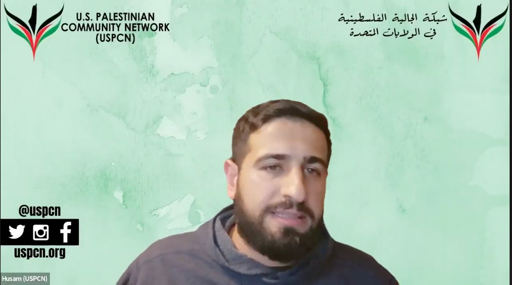![Husam Maradja, of the US Palestinian Community Network [USPCN] Husam Maradja, of the US Palestinian Community Network USPCN](https://i.snap.as/FRqCSv5I.png)
The Anti-War Action Network, a national network of grassroots organizations, held a October 28 webinar to address the meaning of the recent ‘ceasefire’ deal for the Palestine solidarity movement.
Husam Maradja with the US Palestinian Community Network (USPCN), a leading force in the Palestinian liberation movement in the U.S., laid out an analysis of the ceasefire deal and our role as organizers in this period.
Marajda began by lowering expectations that the ceasefire deal will hold due to ongoing Israeli attacks, historic patterns of aggression, and attempts to undermine the agreement through support for collaborationist forces in Gaza. At the time of the event, there were 125 recorded violations of the ceasefire since implementation that killed 94 Palestinians and injured 344.
Despite the attacks, Marajda outlined the gains of the Palestinian liberation movement, shown by its ability to negotiate with leverage after two years of bombing, emphasizing the “will and the steadfastness of our people. They did not accept a ceasefire without demands met to allow for the entry of aid, withdrawal of Israel as far back as possible, the refusal to disarm, the release of 1700 Palestinian prisoners, some of whom were sentenced to life in prison, and allowing for people to mourn, recover, and for the resistance to build militarily and politically.”
Marajda emphasized that Israel was forced into the deal under pressure from Trump, the Gulf States, and Egypt after its failure to achieve any of its military goals including an inability to defeat the resistance despite extensive US. and Western European support, its international isolation and need for rehabilitation, and the strengthening of the Palestine solidarity movement shown through growing BDS campaigns, general strikes, international flotillas, and more.
Maradja also warned that Israel is going to further try to erase or conceal evidence of war crimes with the aid of its Western allies, invest in global campaigns to repair its image, and continue its attacks on Lebanon, Syria and the West Bank.
In response, Marajda called for organizing as “intensely as we were during the genocide before the ceasefire. We have to build the anti-war movement and statewide divestment campaigns, hold politicians accountable, support student organizers, and keep talking about Palestine. We have to make connections with Black liberation and the immigrant rights movement, and stand in solidarity with Venezuela.”
#AntiWarMovement #Palestine #USPCN #AWAN
From Fight Back! News via this RSS feed


